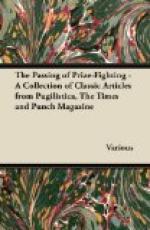A scalene or scaly member has no one side which is equal to his own interest.
Parallel lines of politics are such as are in the same direction—say Downing-street; but which, being produced ever so far—say to Windsor—do not meet.
A political problem is a Tory proposition, showing that the country is to be done.
A theorem is a Whig proposition—the benefit of which to any one but the Whigs always requires to be demonstrated.
A corollary is the consequent confusion brought about by adopting the preceding Whig proposition.
A deduction is that which is drawn from the revenue by adopting the preceding Whig proposition.
* * * * *
MAJOR BENIOWSKY’S NEW ART OF MEMORY
A gentleman who boasts one of those proper names in sky which are naturally enough transmitted “from pole to pole,” undertakes to teach the art of remembering upon entirely new principles. We know not what the merit of his invention may be, but we beg leave to ask the Major a few general questions, and we, therefore, respectfully inquire whether his system would be capable of effecting the following miracles:—
1st. Would it be possible to make Sir James Graham remember that he not long since declared his present colleagues to be men wholly unworthy of public confidence?
2dly. Would Major Beniowsky’s plan compel a man to remember his tailor’s bill; and, if so, would it go so far as to remind him to call for the purpose of paying it?
3dly. Would the new system of memory enable Mr. Wakley to refrain from forgetting himself?
4thly. Would the Phrenotypics, or brain-printing, as it is called, succeed in stereotyping a pledge in the recollection of a member of parliament?
5thly. Is it possible for the new art to cause Sir Robert Peel to remember from one week to the other his political promises?
We fear these questions must be answered in the negative; but we have a plan of our own for exercising the memory, which will beat that of Beniow, or any other sky, who ventures to propose one. Our proposition is, “Read PUNCH,” and we will be bound that no one will ever forget it who has once enjoyed the luxury.
* * * * *
SONGS FOR THE SENTIMENTAL.—NO. 9.
I wander’d through our native
fields,
And one was by my side who seem’d
Fraught with each beauty nature yields,
Whilst from her eye affection beam’d.
It was so like what fairy books,
In painting heaven, are wont to tell,
That fondly I believed those looks,
And found too late—’twas all
a sell!
’Twas all a sell!
She vow’d I was her all—her
life—
And proved, methought, her words by sighs;
She long’d to hear me call her “wife,”
And fed on hope which love supplies.
Ah! then I felt it had been sin
To doubt that she could e’er belie
Her vows!—I found ’twas only tin
She sought, and love was all my eye!
Was all my eye!




